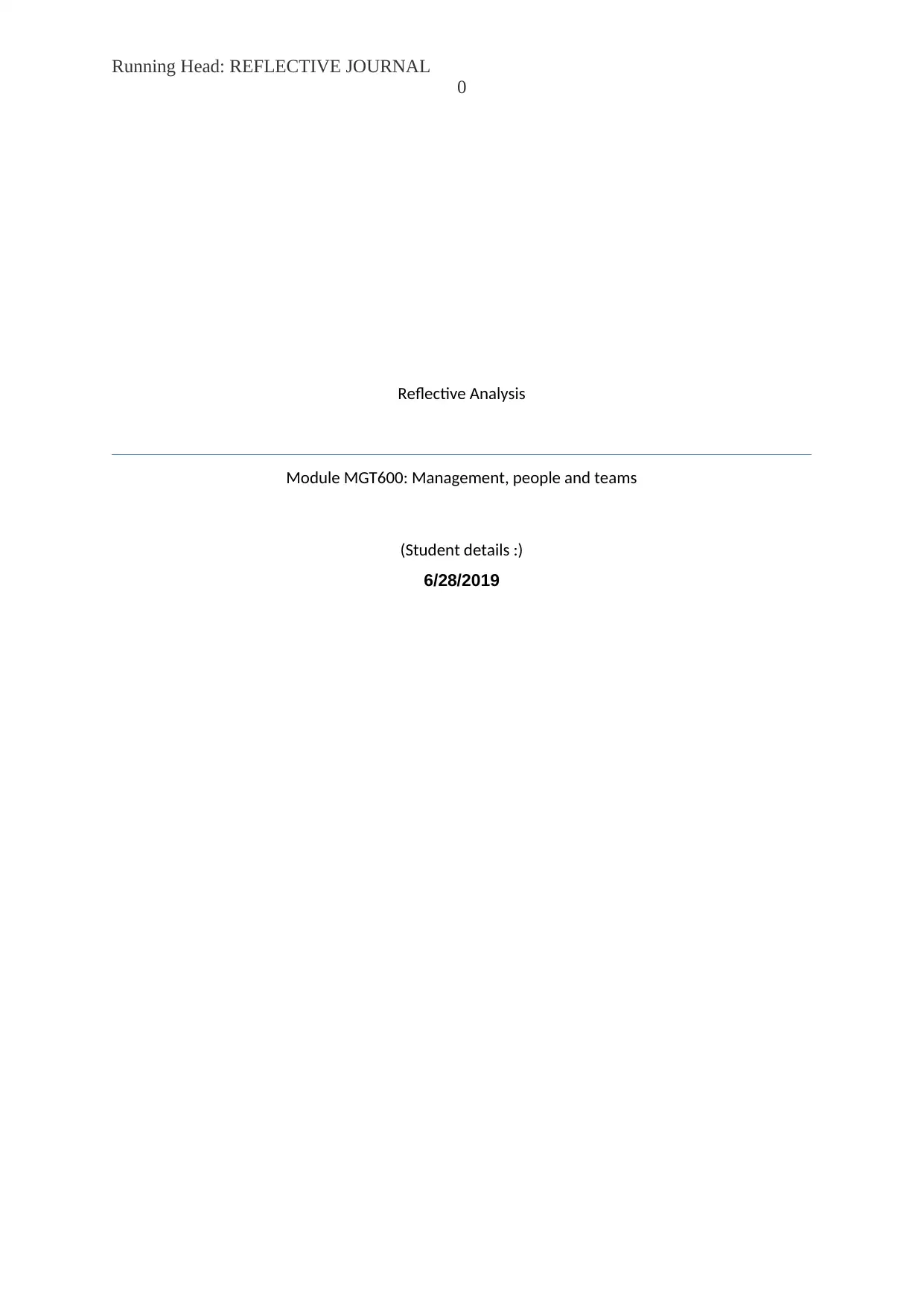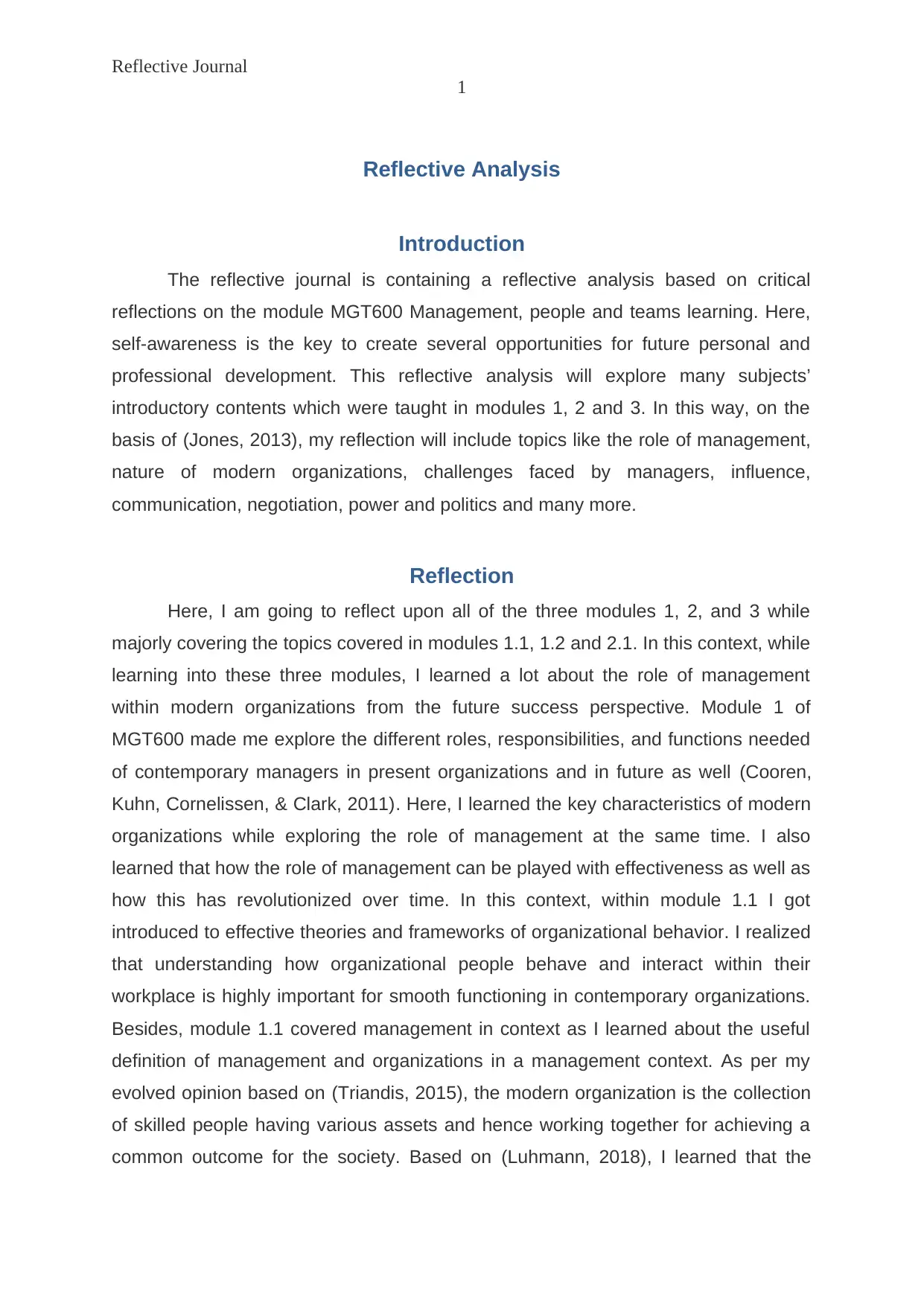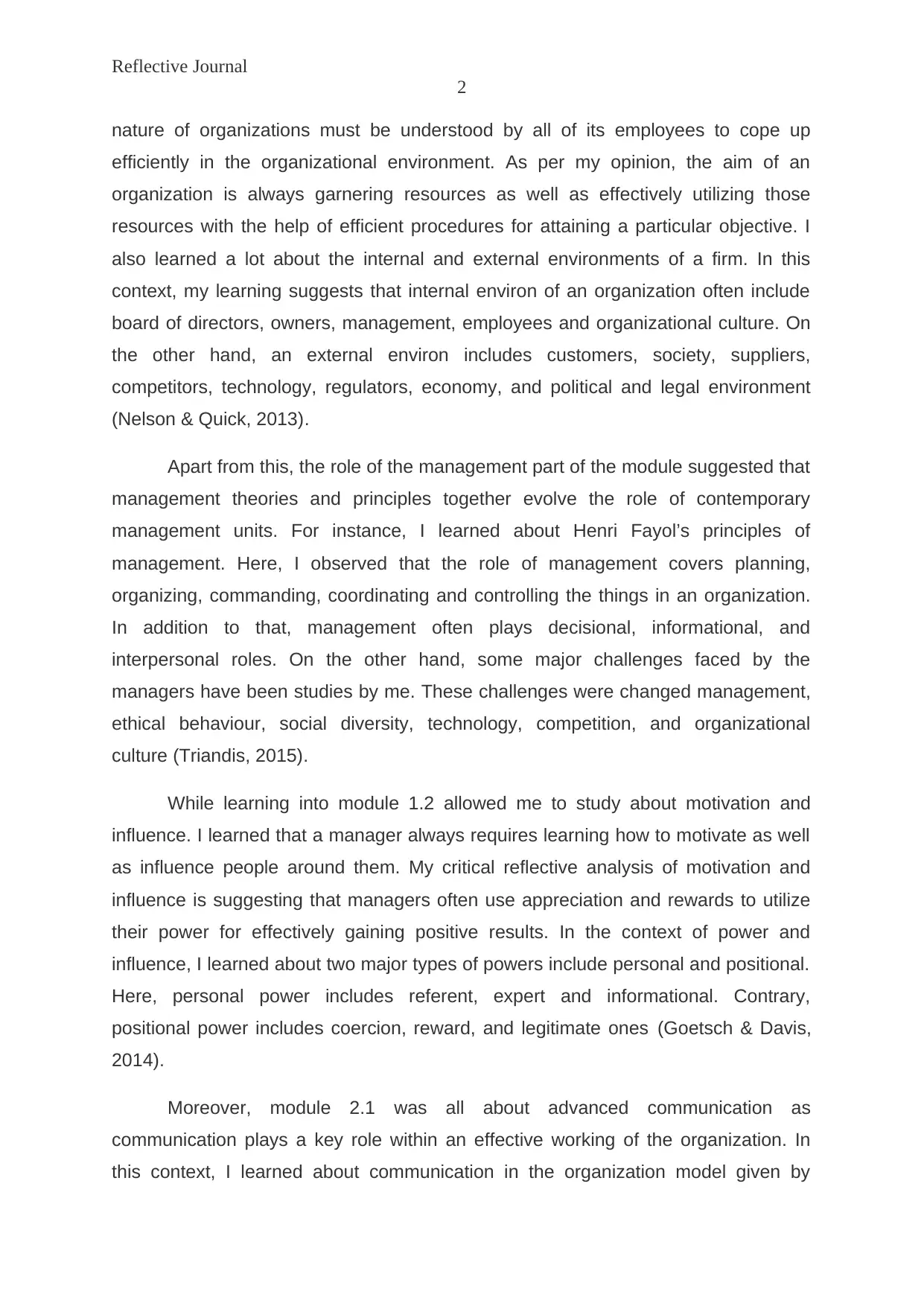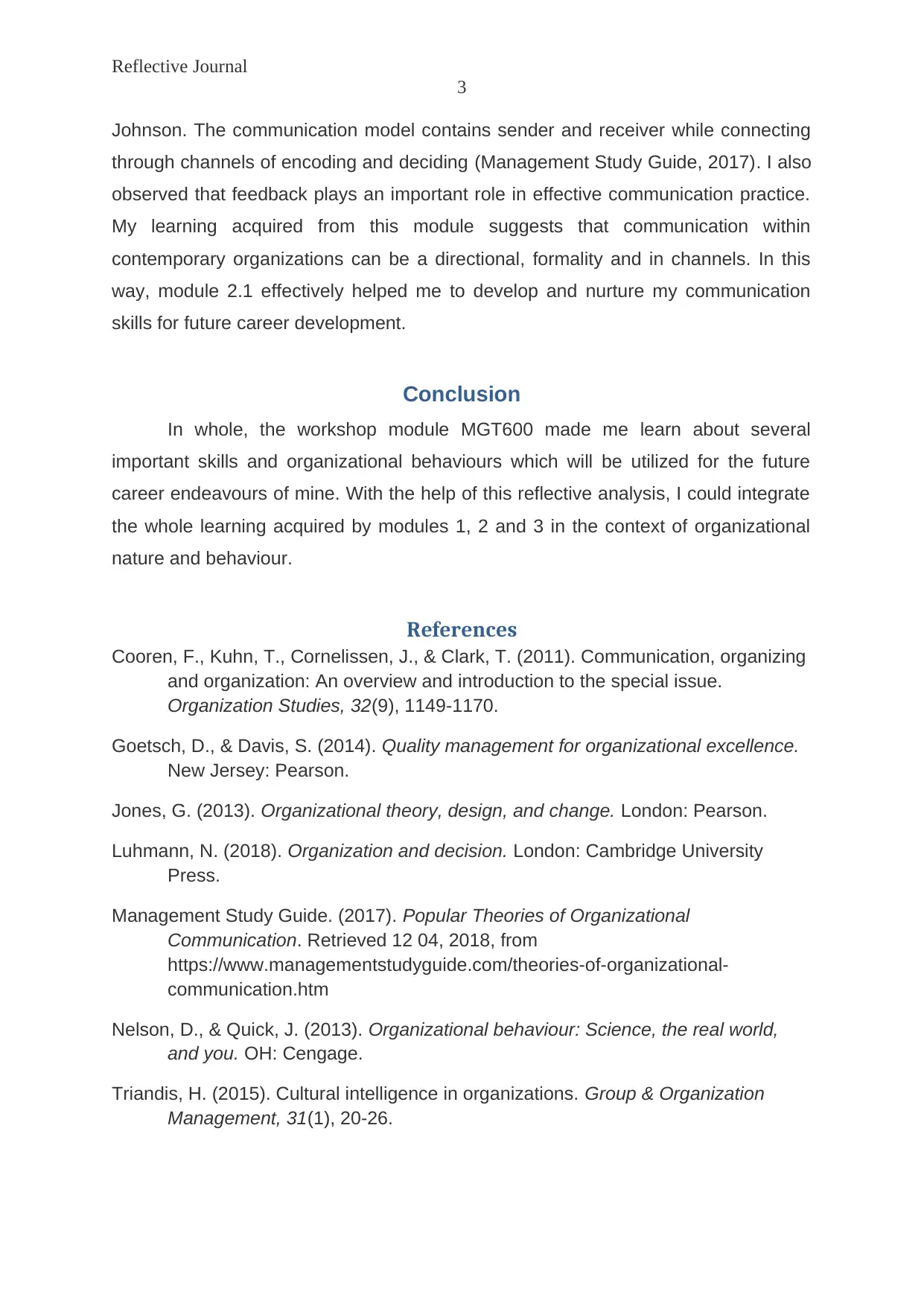Reflective Analysis on Management, People, and Teams - MGT600
VerifiedAdded on 2022/11/28
|5
|1133
|464
Report
AI Summary
This reflective analysis report examines the key concepts and theories covered in the MGT600 Management, People and Teams module, specifically focusing on modules 1, 2, and 3. The report delves into the role of management within modern organizations, exploring topics such as organizational behavior, management functions, and the challenges faced by managers. It analyzes the importance of motivation, influence, and communication within organizational settings, including different types of power and effective communication models. The analysis integrates the learning acquired from the modules to enhance the understanding of organizational nature and behavior, with the aim of developing skills for future career endeavors. The report references various academic sources to support the reflections on the course content and its application to real-world scenarios.

Running Head: REFLECTIVE JOURNAL
0
Reflective Analysis
Module MGT600: Management, people and teams
(Student details :)
6/28/2019
0
Reflective Analysis
Module MGT600: Management, people and teams
(Student details :)
6/28/2019
Paraphrase This Document
Need a fresh take? Get an instant paraphrase of this document with our AI Paraphraser

Reflective Journal
1
Reflective Analysis
Introduction
The reflective journal is containing a reflective analysis based on critical
reflections on the module MGT600 Management, people and teams learning. Here,
self-awareness is the key to create several opportunities for future personal and
professional development. This reflective analysis will explore many subjects’
introductory contents which were taught in modules 1, 2 and 3. In this way, on the
basis of (Jones, 2013), my reflection will include topics like the role of management,
nature of modern organizations, challenges faced by managers, influence,
communication, negotiation, power and politics and many more.
Reflection
Here, I am going to reflect upon all of the three modules 1, 2, and 3 while
majorly covering the topics covered in modules 1.1, 1.2 and 2.1. In this context, while
learning into these three modules, I learned a lot about the role of management
within modern organizations from the future success perspective. Module 1 of
MGT600 made me explore the different roles, responsibilities, and functions needed
of contemporary managers in present organizations and in future as well (Cooren,
Kuhn, Cornelissen, & Clark, 2011). Here, I learned the key characteristics of modern
organizations while exploring the role of management at the same time. I also
learned that how the role of management can be played with effectiveness as well as
how this has revolutionized over time. In this context, within module 1.1 I got
introduced to effective theories and frameworks of organizational behavior. I realized
that understanding how organizational people behave and interact within their
workplace is highly important for smooth functioning in contemporary organizations.
Besides, module 1.1 covered management in context as I learned about the useful
definition of management and organizations in a management context. As per my
evolved opinion based on (Triandis, 2015), the modern organization is the collection
of skilled people having various assets and hence working together for achieving a
common outcome for the society. Based on (Luhmann, 2018), I learned that the
1
Reflective Analysis
Introduction
The reflective journal is containing a reflective analysis based on critical
reflections on the module MGT600 Management, people and teams learning. Here,
self-awareness is the key to create several opportunities for future personal and
professional development. This reflective analysis will explore many subjects’
introductory contents which were taught in modules 1, 2 and 3. In this way, on the
basis of (Jones, 2013), my reflection will include topics like the role of management,
nature of modern organizations, challenges faced by managers, influence,
communication, negotiation, power and politics and many more.
Reflection
Here, I am going to reflect upon all of the three modules 1, 2, and 3 while
majorly covering the topics covered in modules 1.1, 1.2 and 2.1. In this context, while
learning into these three modules, I learned a lot about the role of management
within modern organizations from the future success perspective. Module 1 of
MGT600 made me explore the different roles, responsibilities, and functions needed
of contemporary managers in present organizations and in future as well (Cooren,
Kuhn, Cornelissen, & Clark, 2011). Here, I learned the key characteristics of modern
organizations while exploring the role of management at the same time. I also
learned that how the role of management can be played with effectiveness as well as
how this has revolutionized over time. In this context, within module 1.1 I got
introduced to effective theories and frameworks of organizational behavior. I realized
that understanding how organizational people behave and interact within their
workplace is highly important for smooth functioning in contemporary organizations.
Besides, module 1.1 covered management in context as I learned about the useful
definition of management and organizations in a management context. As per my
evolved opinion based on (Triandis, 2015), the modern organization is the collection
of skilled people having various assets and hence working together for achieving a
common outcome for the society. Based on (Luhmann, 2018), I learned that the

Reflective Journal
2
nature of organizations must be understood by all of its employees to cope up
efficiently in the organizational environment. As per my opinion, the aim of an
organization is always garnering resources as well as effectively utilizing those
resources with the help of efficient procedures for attaining a particular objective. I
also learned a lot about the internal and external environments of a firm. In this
context, my learning suggests that internal environ of an organization often include
board of directors, owners, management, employees and organizational culture. On
the other hand, an external environ includes customers, society, suppliers,
competitors, technology, regulators, economy, and political and legal environment
(Nelson & Quick, 2013).
Apart from this, the role of the management part of the module suggested that
management theories and principles together evolve the role of contemporary
management units. For instance, I learned about Henri Fayol’s principles of
management. Here, I observed that the role of management covers planning,
organizing, commanding, coordinating and controlling the things in an organization.
In addition to that, management often plays decisional, informational, and
interpersonal roles. On the other hand, some major challenges faced by the
managers have been studies by me. These challenges were changed management,
ethical behaviour, social diversity, technology, competition, and organizational
culture (Triandis, 2015).
While learning into module 1.2 allowed me to study about motivation and
influence. I learned that a manager always requires learning how to motivate as well
as influence people around them. My critical reflective analysis of motivation and
influence is suggesting that managers often use appreciation and rewards to utilize
their power for effectively gaining positive results. In the context of power and
influence, I learned about two major types of powers include personal and positional.
Here, personal power includes referent, expert and informational. Contrary,
positional power includes coercion, reward, and legitimate ones (Goetsch & Davis,
2014).
Moreover, module 2.1 was all about advanced communication as
communication plays a key role within an effective working of the organization. In
this context, I learned about communication in the organization model given by
2
nature of organizations must be understood by all of its employees to cope up
efficiently in the organizational environment. As per my opinion, the aim of an
organization is always garnering resources as well as effectively utilizing those
resources with the help of efficient procedures for attaining a particular objective. I
also learned a lot about the internal and external environments of a firm. In this
context, my learning suggests that internal environ of an organization often include
board of directors, owners, management, employees and organizational culture. On
the other hand, an external environ includes customers, society, suppliers,
competitors, technology, regulators, economy, and political and legal environment
(Nelson & Quick, 2013).
Apart from this, the role of the management part of the module suggested that
management theories and principles together evolve the role of contemporary
management units. For instance, I learned about Henri Fayol’s principles of
management. Here, I observed that the role of management covers planning,
organizing, commanding, coordinating and controlling the things in an organization.
In addition to that, management often plays decisional, informational, and
interpersonal roles. On the other hand, some major challenges faced by the
managers have been studies by me. These challenges were changed management,
ethical behaviour, social diversity, technology, competition, and organizational
culture (Triandis, 2015).
While learning into module 1.2 allowed me to study about motivation and
influence. I learned that a manager always requires learning how to motivate as well
as influence people around them. My critical reflective analysis of motivation and
influence is suggesting that managers often use appreciation and rewards to utilize
their power for effectively gaining positive results. In the context of power and
influence, I learned about two major types of powers include personal and positional.
Here, personal power includes referent, expert and informational. Contrary,
positional power includes coercion, reward, and legitimate ones (Goetsch & Davis,
2014).
Moreover, module 2.1 was all about advanced communication as
communication plays a key role within an effective working of the organization. In
this context, I learned about communication in the organization model given by
⊘ This is a preview!⊘
Do you want full access?
Subscribe today to unlock all pages.

Trusted by 1+ million students worldwide

Reflective Journal
3
Johnson. The communication model contains sender and receiver while connecting
through channels of encoding and deciding (Management Study Guide, 2017). I also
observed that feedback plays an important role in effective communication practice.
My learning acquired from this module suggests that communication within
contemporary organizations can be a directional, formality and in channels. In this
way, module 2.1 effectively helped me to develop and nurture my communication
skills for future career development.
Conclusion
In whole, the workshop module MGT600 made me learn about several
important skills and organizational behaviours which will be utilized for the future
career endeavours of mine. With the help of this reflective analysis, I could integrate
the whole learning acquired by modules 1, 2 and 3 in the context of organizational
nature and behaviour.
References
Cooren, F., Kuhn, T., Cornelissen, J., & Clark, T. (2011). Communication, organizing
and organization: An overview and introduction to the special issue.
Organization Studies, 32(9), 1149-1170.
Goetsch, D., & Davis, S. (2014). Quality management for organizational excellence.
New Jersey: Pearson.
Jones, G. (2013). Organizational theory, design, and change. London: Pearson.
Luhmann, N. (2018). Organization and decision. London: Cambridge University
Press.
Management Study Guide. (2017). Popular Theories of Organizational
Communication. Retrieved 12 04, 2018, from
https://www.managementstudyguide.com/theories-of-organizational-
communication.htm
Nelson, D., & Quick, J. (2013). Organizational behaviour: Science, the real world,
and you. OH: Cengage.
Triandis, H. (2015). Cultural intelligence in organizations. Group & Organization
Management, 31(1), 20-26.
3
Johnson. The communication model contains sender and receiver while connecting
through channels of encoding and deciding (Management Study Guide, 2017). I also
observed that feedback plays an important role in effective communication practice.
My learning acquired from this module suggests that communication within
contemporary organizations can be a directional, formality and in channels. In this
way, module 2.1 effectively helped me to develop and nurture my communication
skills for future career development.
Conclusion
In whole, the workshop module MGT600 made me learn about several
important skills and organizational behaviours which will be utilized for the future
career endeavours of mine. With the help of this reflective analysis, I could integrate
the whole learning acquired by modules 1, 2 and 3 in the context of organizational
nature and behaviour.
References
Cooren, F., Kuhn, T., Cornelissen, J., & Clark, T. (2011). Communication, organizing
and organization: An overview and introduction to the special issue.
Organization Studies, 32(9), 1149-1170.
Goetsch, D., & Davis, S. (2014). Quality management for organizational excellence.
New Jersey: Pearson.
Jones, G. (2013). Organizational theory, design, and change. London: Pearson.
Luhmann, N. (2018). Organization and decision. London: Cambridge University
Press.
Management Study Guide. (2017). Popular Theories of Organizational
Communication. Retrieved 12 04, 2018, from
https://www.managementstudyguide.com/theories-of-organizational-
communication.htm
Nelson, D., & Quick, J. (2013). Organizational behaviour: Science, the real world,
and you. OH: Cengage.
Triandis, H. (2015). Cultural intelligence in organizations. Group & Organization
Management, 31(1), 20-26.
Paraphrase This Document
Need a fresh take? Get an instant paraphrase of this document with our AI Paraphraser

Reflective Journal
4
4
1 out of 5
Related Documents
Your All-in-One AI-Powered Toolkit for Academic Success.
+13062052269
info@desklib.com
Available 24*7 on WhatsApp / Email
![[object Object]](/_next/static/media/star-bottom.7253800d.svg)
Unlock your academic potential
Copyright © 2020–2026 A2Z Services. All Rights Reserved. Developed and managed by ZUCOL.





